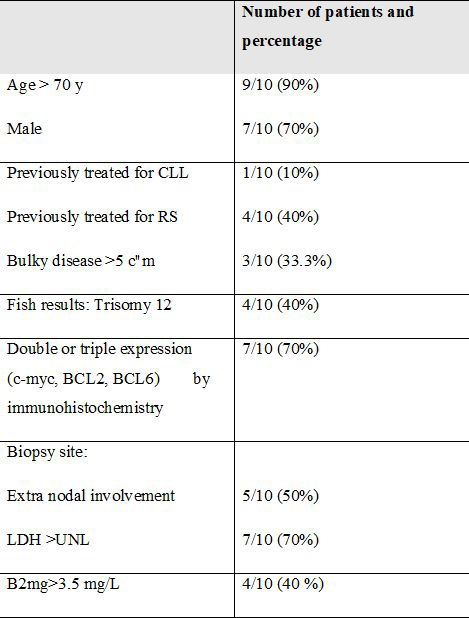Background: Richter's syndrome (RS) is an aggressive histologic transformation of chronic lymphocytic leukemia (CLL), most commonly to diffuse large B-cell lymphoma (DLBCL). RS is characterized by a rapid clinical course, low responses to therapy, and poor long-term survival. Chemoimmunothreapy for RS achieves overall response rates of 40% to 60%, and median progression-free survival (PFS) and overall survival (OS) of 3 to 10 months and 6 to 21 months, respectively. More recently, single targeted agents of either ibrutinib or venetocolax have been shown some clinical activity in RS. Furthermore, ibrutinib combined with venetoclax with or without anti-CD20 antibodies has a synergistic activity in CLL, resulting in deep and prolong responses along with a good safety profile.
Methods: This is a prospective phase 2, open-label, non-randomized, single-arm, multi-center study aimed to assess the efficacy and safety of ibrutinib, venetoclax, and obinutuzumab in treatment-naïve or relapsed/refractory patients with biopsy-confirmed RS to DLBCL (NCT04939363). The experimental regimen consisted of 12 months of fixed-duration treatment with obinutuzumab, ibrutinib, and venetoclax. Obinutuzumab was administered at a dose of 100 mg intravenously on day 1, 900 mg on day 2, and then 1000 mg on day 8 and 15 of cycle 1. On day 1 of the subsequent five cycles, obinutuzumab at a dose of 1000 mg was administered. Ibrutinib was administered at a dose of 560mg orally daily initiated together with the first obinutuzumab infusion on day 1 of cycle 1 and was continued throughout the 12 treatment 28-day cycles. Venetoclax was given at a dose of 400 mg orally daily for 12 treatment cycles after an accelerated ramp-up phase from day 15 in cycle 1. The primary endpoint was investigator-assessed overall response rate (ORR) defined as the proportion of patients who achieve complete metabolic response (CR) and partial metabolic response (PR) determined by PET-CT imaging at 6 months per Lugano 2014 criteria. Other key endpoints included; investigator-assessed ORR at 3 and 12 months, PFS, Duration of response (DOR), OS, and safety.
Results: From August 2021 until the data cut-off on July 20, 2023, a total of 10 patients with RS were enrolled. Median age was 76.0 (range, 62‒88) years and 70% were male. Six patients were treatment-naïve, 4 had relapsed/refractory RS, 50% had extra-nodal disease, 70% had elevated LDH, 70% were double or triple expressors, and the median number of prior therapies among the R/R patients was 1 (Table 1). Median follow-up was 255 days (95% CI, 158.7-351.3), median treatment duration was 160 days (range: 29-362) and treatment is still ongoing in 3 patients. At 3 and 6 months, the ORRs were 70.0% (7/10) and 22.2% (2/9), respectively, and CR rates (CRRs) were 40.0% (4/10) and 11.1% (1/9), respectively. At the data cutoff, 6/10 (60.0%) patients progressed and 5/10 (50.0%) died. The median PFS was 162 days (95% CI, 66.9-257.1), median DOR 272 days, and median OS was 228 days (95% CI: 184.2-271.8). The causes of death included RS in 2 patients and one case each of Covid-19, secondary malignancy, and general deterioration. Most common related treatment-emergent AEs (TEAEs) of all grades were neutropenia 40%, thrombocytopenia 50%, diarrhea 40%, and skin rash 50%, 2 patients developed Covid-19 who recovered during the protocol. None of the patients developed tumor lysis syndromes.
Conclusions: In patients with RS triplet treatment with ibrutinib, venetoclax, and obinutuzmab was well tolerated, achieved high rates of early metabolic response (ORR-70% and CRR-40%) at 3 months. Given the high early response rate but subsequent progression, this triplet therapy may serve as a bridge to consolidation with cellular therapy.
Disclosures
Tadmor:janssen,: Research Funding; Abbvie, ROCHE, Janssen, AstraZeneca, takeda: Consultancy, Honoraria. Benjamini:Abbvie, Janssen, AstraZeneca: Consultancy. Wolach:Abbvie: Consultancy, Honoraria, Research Funding; Astellas: Consultancy, Honoraria; Medison: Honoraria. Herishanu:Abbvie: Honoraria; Lilly: Honoraria; AstraZeneca: Honoraria; Roche: Honoraria; Janssen: Honoraria, Research Funding.


This feature is available to Subscribers Only
Sign In or Create an Account Close Modal